River Island: Leadership's Role in Employee Development - Project
VerifiedAdded on 2023/06/08
|26
|5763
|100
Project
AI Summary
This research project investigates the role of line managers and leaders in employee development within River Island, a UK-based multi-channel fashion brand. It aims to analyze the concepts and elements of talent management in the UK retail industry, explore the roles of leaders and line managers in developing and managing talented workforces, and assess the issues they face. The methodology employs a positivism research philosophy and a deductive approach, utilizing surveys to gather data from River Island employees. The study examines existing literature on talent management, leadership roles, and challenges in employee development, providing insights into improving employee motivation, teamwork, and skills within the organization. This project seeks to contribute to a better understanding of talent management practices and their impact on employee growth in the retail sector. Desklib provides access to this project and numerous other solved assignments and past papers.

Research Project
Paraphrase This Document
Need a fresh take? Get an instant paraphrase of this document with our AI Paraphraser
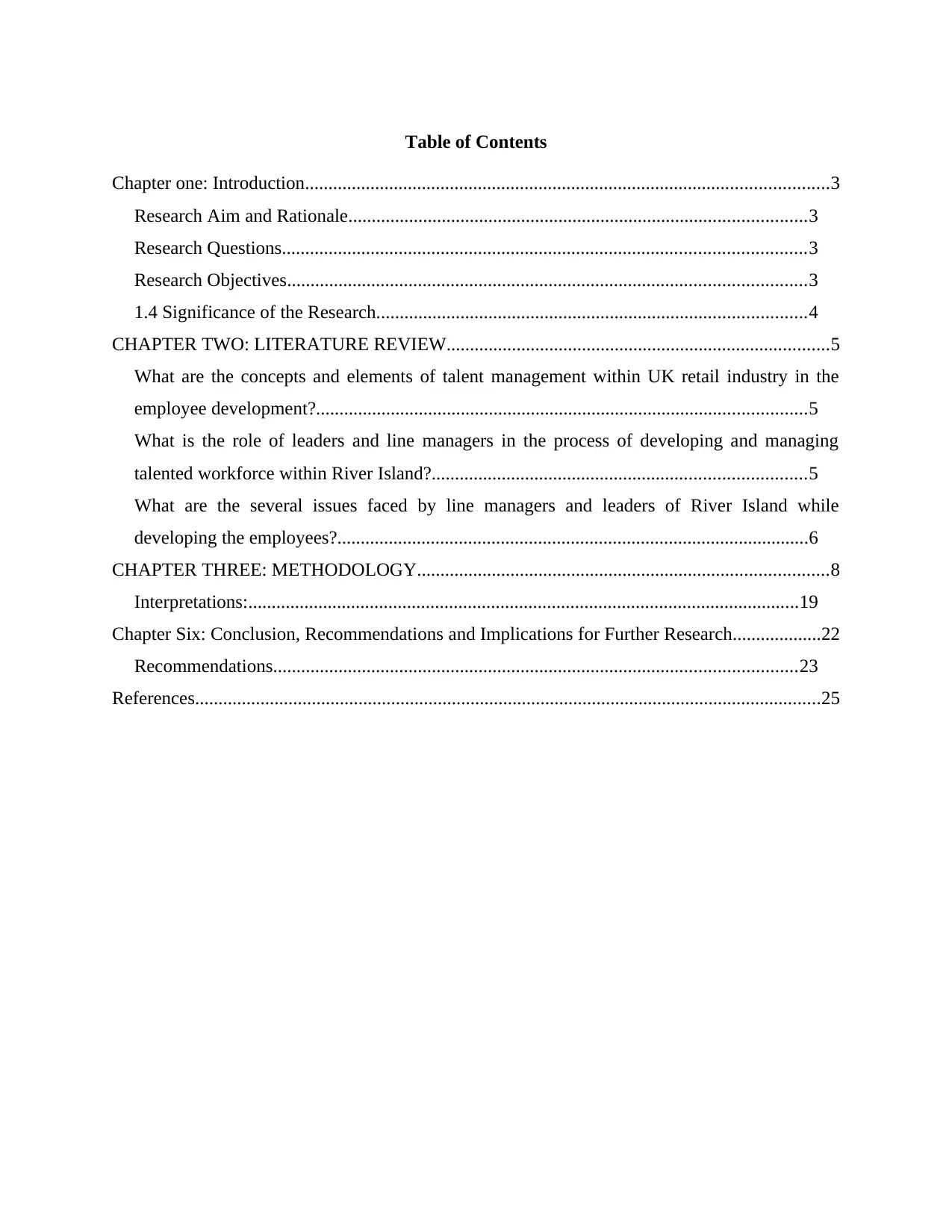
Table of Contents
Chapter one: Introduction................................................................................................................3
Research Aim and Rationale..................................................................................................3
Research Questions................................................................................................................3
Research Objectives...............................................................................................................3
1.4 Significance of the Research............................................................................................4
CHAPTER TWO: LITERATURE REVIEW..................................................................................5
What are the concepts and elements of talent management within UK retail industry in the
employee development?.........................................................................................................5
What is the role of leaders and line managers in the process of developing and managing
talented workforce within River Island?................................................................................5
What are the several issues faced by line managers and leaders of River Island while
developing the employees?.....................................................................................................6
CHAPTER THREE: METHODOLOGY........................................................................................8
Interpretations:......................................................................................................................19
Chapter Six: Conclusion, Recommendations and Implications for Further Research...................22
Recommendations................................................................................................................23
References......................................................................................................................................25
Chapter one: Introduction................................................................................................................3
Research Aim and Rationale..................................................................................................3
Research Questions................................................................................................................3
Research Objectives...............................................................................................................3
1.4 Significance of the Research............................................................................................4
CHAPTER TWO: LITERATURE REVIEW..................................................................................5
What are the concepts and elements of talent management within UK retail industry in the
employee development?.........................................................................................................5
What is the role of leaders and line managers in the process of developing and managing
talented workforce within River Island?................................................................................5
What are the several issues faced by line managers and leaders of River Island while
developing the employees?.....................................................................................................6
CHAPTER THREE: METHODOLOGY........................................................................................8
Interpretations:......................................................................................................................19
Chapter Six: Conclusion, Recommendations and Implications for Further Research...................22
Recommendations................................................................................................................23
References......................................................................................................................................25
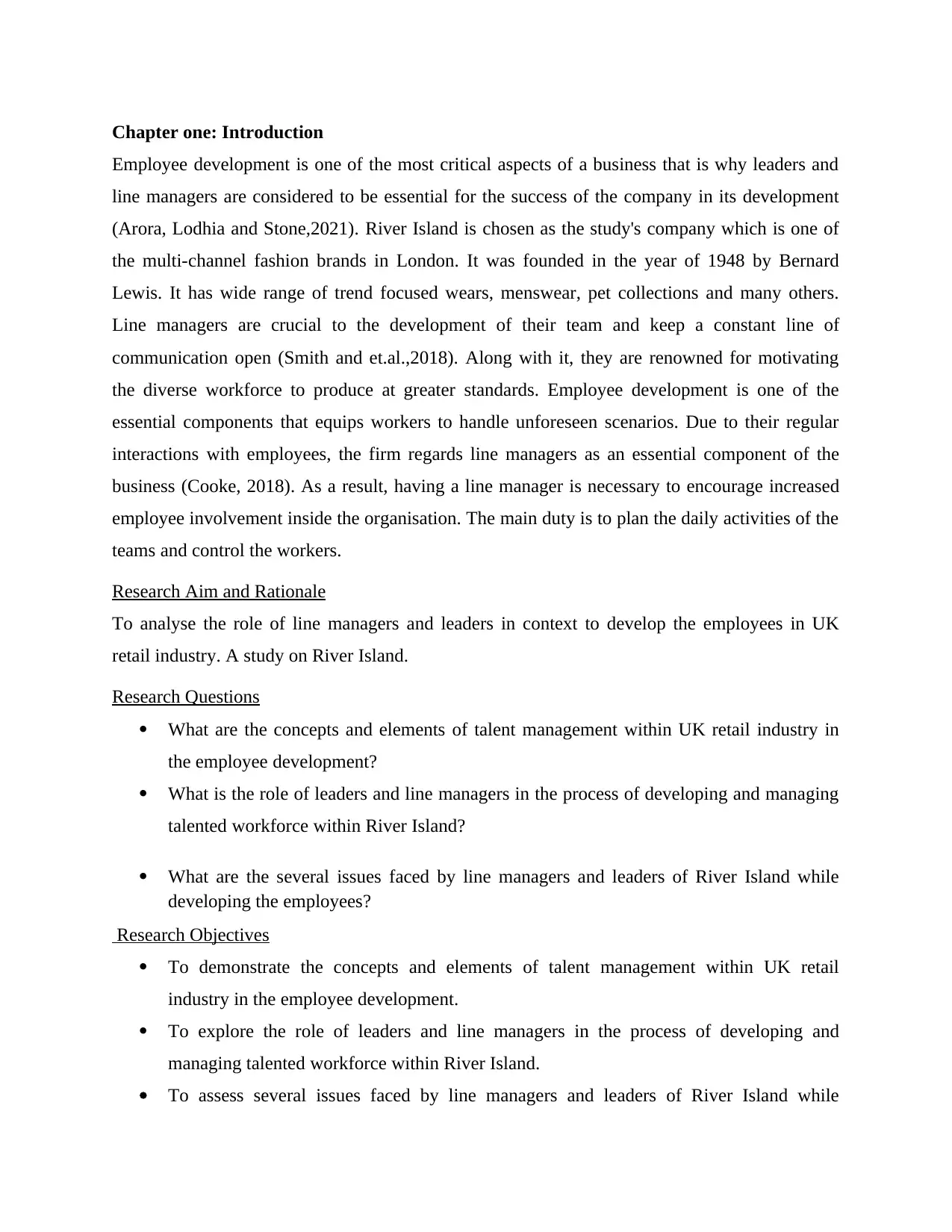
Chapter one: Introduction
Employee development is one of the most critical aspects of a business that is why leaders and
line managers are considered to be essential for the success of the company in its development
(Arora, Lodhia and Stone,2021). River Island is chosen as the study's company which is one of
the multi-channel fashion brands in London. It was founded in the year of 1948 by Bernard
Lewis. It has wide range of trend focused wears, menswear, pet collections and many others.
Line managers are crucial to the development of their team and keep a constant line of
communication open (Smith and et.al.,2018). Along with it, they are renowned for motivating
the diverse workforce to produce at greater standards. Employee development is one of the
essential components that equips workers to handle unforeseen scenarios. Due to their regular
interactions with employees, the firm regards line managers as an essential component of the
business (Cooke, 2018). As a result, having a line manager is necessary to encourage increased
employee involvement inside the organisation. The main duty is to plan the daily activities of the
teams and control the workers.
Research Aim and Rationale
To analyse the role of line managers and leaders in context to develop the employees in UK
retail industry. A study on River Island.
Research Questions
What are the concepts and elements of talent management within UK retail industry in
the employee development?
What is the role of leaders and line managers in the process of developing and managing
talented workforce within River Island?
What are the several issues faced by line managers and leaders of River Island while
developing the employees?
Research Objectives
To demonstrate the concepts and elements of talent management within UK retail
industry in the employee development.
To explore the role of leaders and line managers in the process of developing and
managing talented workforce within River Island.
To assess several issues faced by line managers and leaders of River Island while
Employee development is one of the most critical aspects of a business that is why leaders and
line managers are considered to be essential for the success of the company in its development
(Arora, Lodhia and Stone,2021). River Island is chosen as the study's company which is one of
the multi-channel fashion brands in London. It was founded in the year of 1948 by Bernard
Lewis. It has wide range of trend focused wears, menswear, pet collections and many others.
Line managers are crucial to the development of their team and keep a constant line of
communication open (Smith and et.al.,2018). Along with it, they are renowned for motivating
the diverse workforce to produce at greater standards. Employee development is one of the
essential components that equips workers to handle unforeseen scenarios. Due to their regular
interactions with employees, the firm regards line managers as an essential component of the
business (Cooke, 2018). As a result, having a line manager is necessary to encourage increased
employee involvement inside the organisation. The main duty is to plan the daily activities of the
teams and control the workers.
Research Aim and Rationale
To analyse the role of line managers and leaders in context to develop the employees in UK
retail industry. A study on River Island.
Research Questions
What are the concepts and elements of talent management within UK retail industry in
the employee development?
What is the role of leaders and line managers in the process of developing and managing
talented workforce within River Island?
What are the several issues faced by line managers and leaders of River Island while
developing the employees?
Research Objectives
To demonstrate the concepts and elements of talent management within UK retail
industry in the employee development.
To explore the role of leaders and line managers in the process of developing and
managing talented workforce within River Island.
To assess several issues faced by line managers and leaders of River Island while
⊘ This is a preview!⊘
Do you want full access?
Subscribe today to unlock all pages.

Trusted by 1+ million students worldwide
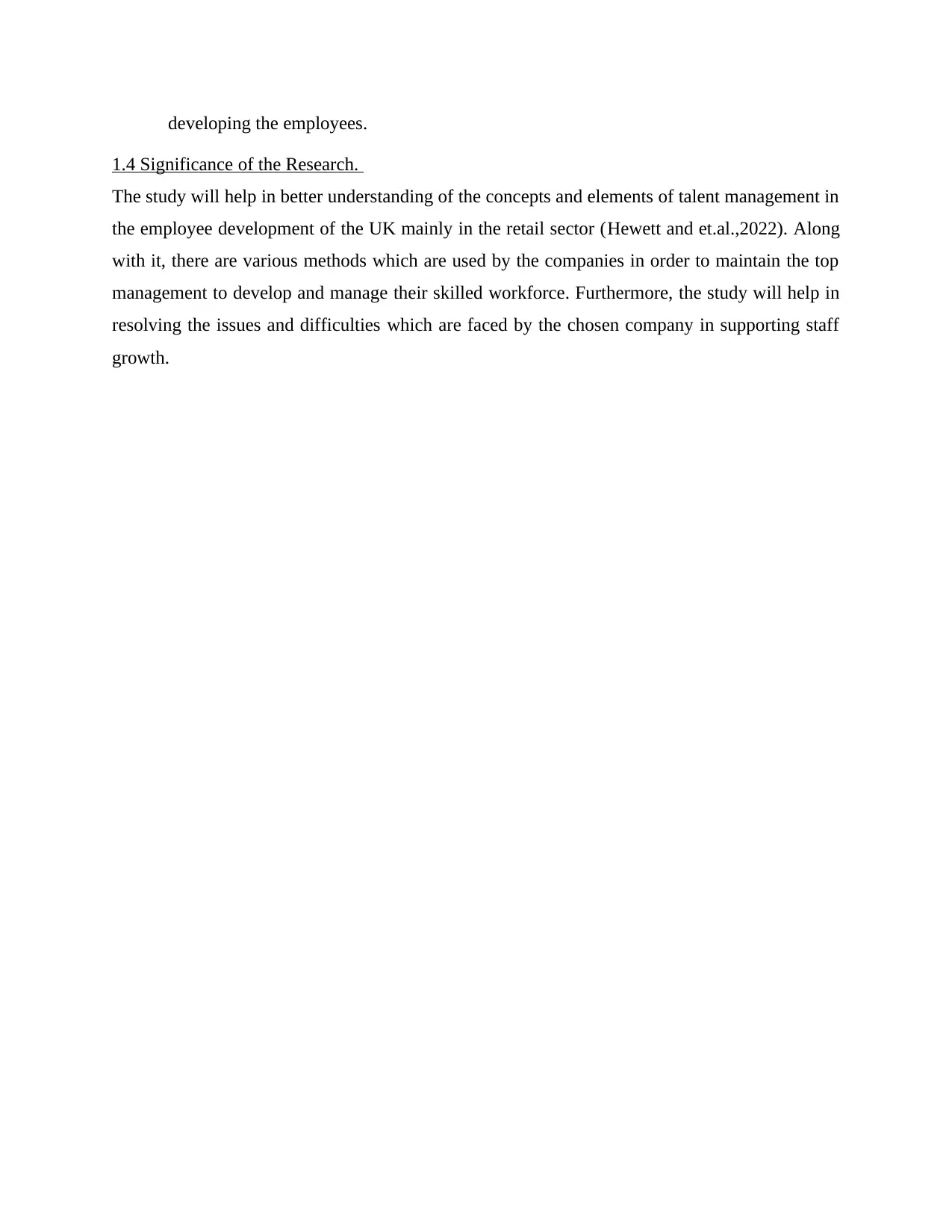
developing the employees.
1.4 Significance of the Research.
The study will help in better understanding of the concepts and elements of talent management in
the employee development of the UK mainly in the retail sector (Hewett and et.al.,2022). Along
with it, there are various methods which are used by the companies in order to maintain the top
management to develop and manage their skilled workforce. Furthermore, the study will help in
resolving the issues and difficulties which are faced by the chosen company in supporting staff
growth.
1.4 Significance of the Research.
The study will help in better understanding of the concepts and elements of talent management in
the employee development of the UK mainly in the retail sector (Hewett and et.al.,2022). Along
with it, there are various methods which are used by the companies in order to maintain the top
management to develop and manage their skilled workforce. Furthermore, the study will help in
resolving the issues and difficulties which are faced by the chosen company in supporting staff
growth.
Paraphrase This Document
Need a fresh take? Get an instant paraphrase of this document with our AI Paraphraser
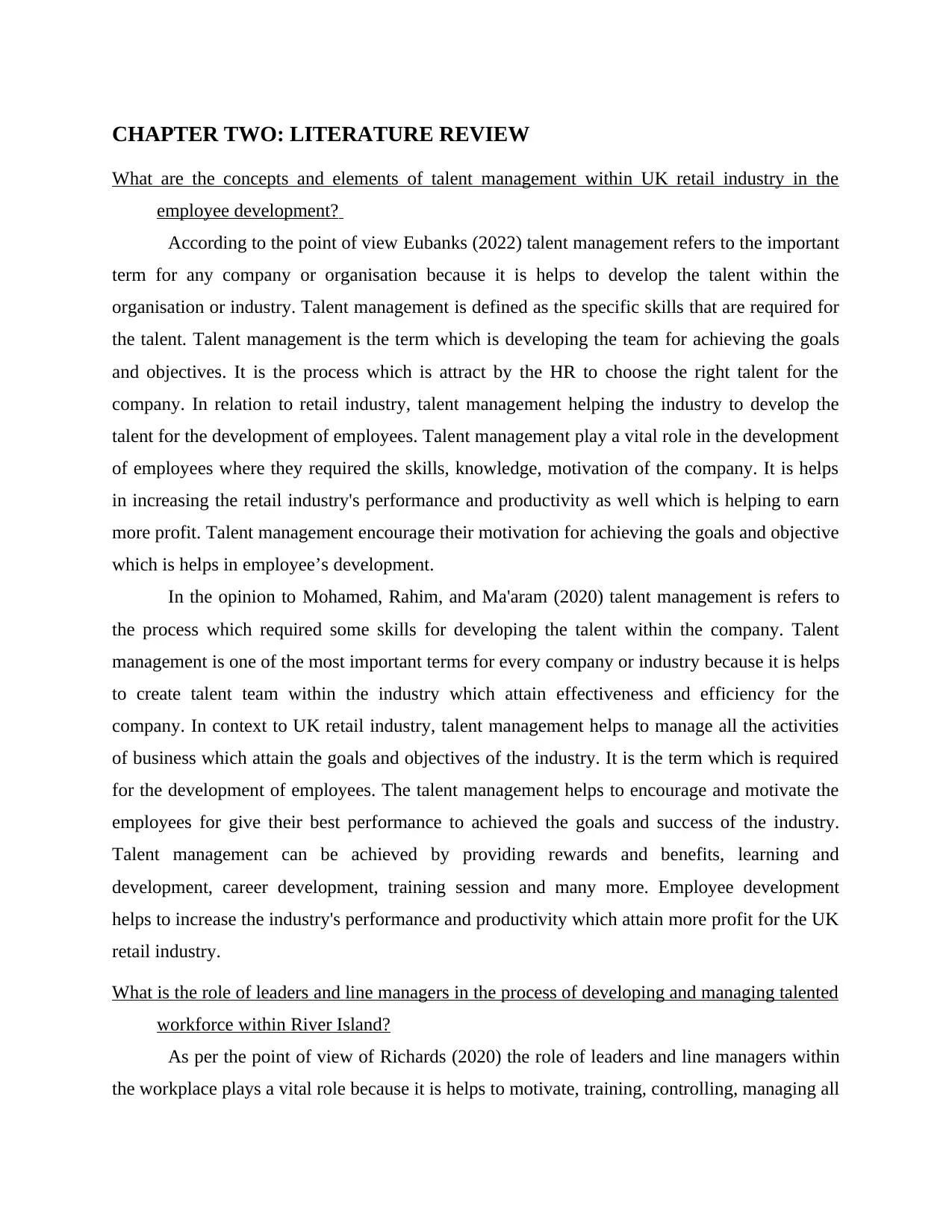
CHAPTER TWO: LITERATURE REVIEW
What are the concepts and elements of talent management within UK retail industry in the
employee development?
According to the point of view Eubanks (2022) talent management refers to the important
term for any company or organisation because it is helps to develop the talent within the
organisation or industry. Talent management is defined as the specific skills that are required for
the talent. Talent management is the term which is developing the team for achieving the goals
and objectives. It is the process which is attract by the HR to choose the right talent for the
company. In relation to retail industry, talent management helping the industry to develop the
talent for the development of employees. Talent management play a vital role in the development
of employees where they required the skills, knowledge, motivation of the company. It is helps
in increasing the retail industry's performance and productivity as well which is helping to earn
more profit. Talent management encourage their motivation for achieving the goals and objective
which is helps in employee’s development.
In the opinion to Mohamed, Rahim, and Ma'aram (2020) talent management is refers to
the process which required some skills for developing the talent within the company. Talent
management is one of the most important terms for every company or industry because it is helps
to create talent team within the industry which attain effectiveness and efficiency for the
company. In context to UK retail industry, talent management helps to manage all the activities
of business which attain the goals and objectives of the industry. It is the term which is required
for the development of employees. The talent management helps to encourage and motivate the
employees for give their best performance to achieved the goals and success of the industry.
Talent management can be achieved by providing rewards and benefits, learning and
development, career development, training session and many more. Employee development
helps to increase the industry's performance and productivity which attain more profit for the UK
retail industry.
What is the role of leaders and line managers in the process of developing and managing talented
workforce within River Island?
As per the point of view of Richards (2020) the role of leaders and line managers within
the workplace plays a vital role because it is helps to motivate, training, controlling, managing all
What are the concepts and elements of talent management within UK retail industry in the
employee development?
According to the point of view Eubanks (2022) talent management refers to the important
term for any company or organisation because it is helps to develop the talent within the
organisation or industry. Talent management is defined as the specific skills that are required for
the talent. Talent management is the term which is developing the team for achieving the goals
and objectives. It is the process which is attract by the HR to choose the right talent for the
company. In relation to retail industry, talent management helping the industry to develop the
talent for the development of employees. Talent management play a vital role in the development
of employees where they required the skills, knowledge, motivation of the company. It is helps
in increasing the retail industry's performance and productivity as well which is helping to earn
more profit. Talent management encourage their motivation for achieving the goals and objective
which is helps in employee’s development.
In the opinion to Mohamed, Rahim, and Ma'aram (2020) talent management is refers to
the process which required some skills for developing the talent within the company. Talent
management is one of the most important terms for every company or industry because it is helps
to create talent team within the industry which attain effectiveness and efficiency for the
company. In context to UK retail industry, talent management helps to manage all the activities
of business which attain the goals and objectives of the industry. It is the term which is required
for the development of employees. The talent management helps to encourage and motivate the
employees for give their best performance to achieved the goals and success of the industry.
Talent management can be achieved by providing rewards and benefits, learning and
development, career development, training session and many more. Employee development
helps to increase the industry's performance and productivity which attain more profit for the UK
retail industry.
What is the role of leaders and line managers in the process of developing and managing talented
workforce within River Island?
As per the point of view of Richards (2020) the role of leaders and line managers within
the workplace plays a vital role because it is helps to motivate, training, controlling, managing all
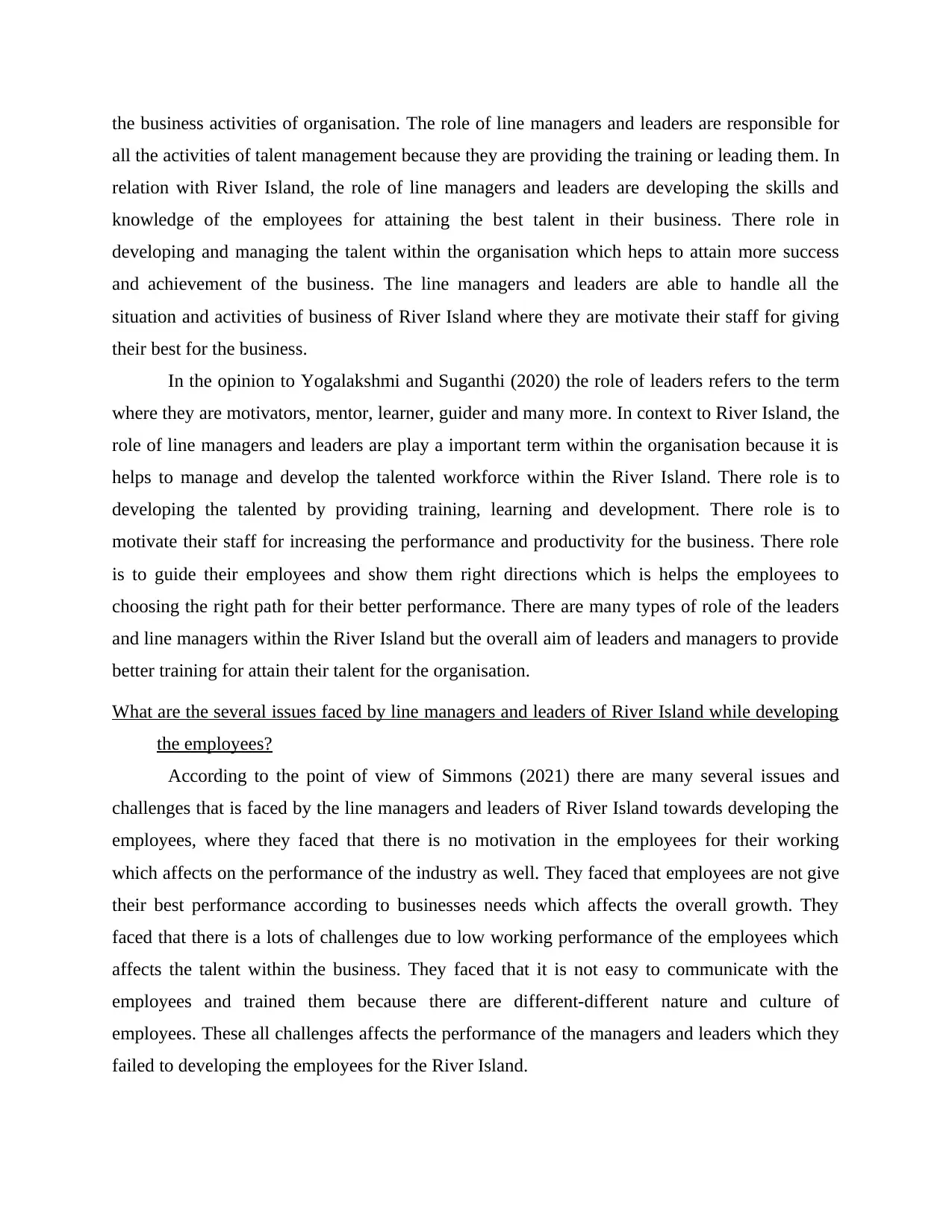
the business activities of organisation. The role of line managers and leaders are responsible for
all the activities of talent management because they are providing the training or leading them. In
relation with River Island, the role of line managers and leaders are developing the skills and
knowledge of the employees for attaining the best talent in their business. There role in
developing and managing the talent within the organisation which heps to attain more success
and achievement of the business. The line managers and leaders are able to handle all the
situation and activities of business of River Island where they are motivate their staff for giving
their best for the business.
In the opinion to Yogalakshmi and Suganthi (2020) the role of leaders refers to the term
where they are motivators, mentor, learner, guider and many more. In context to River Island, the
role of line managers and leaders are play a important term within the organisation because it is
helps to manage and develop the talented workforce within the River Island. There role is to
developing the talented by providing training, learning and development. There role is to
motivate their staff for increasing the performance and productivity for the business. There role
is to guide their employees and show them right directions which is helps the employees to
choosing the right path for their better performance. There are many types of role of the leaders
and line managers within the River Island but the overall aim of leaders and managers to provide
better training for attain their talent for the organisation.
What are the several issues faced by line managers and leaders of River Island while developing
the employees?
According to the point of view of Simmons (2021) there are many several issues and
challenges that is faced by the line managers and leaders of River Island towards developing the
employees, where they faced that there is no motivation in the employees for their working
which affects on the performance of the industry as well. They faced that employees are not give
their best performance according to businesses needs which affects the overall growth. They
faced that there is a lots of challenges due to low working performance of the employees which
affects the talent within the business. They faced that it is not easy to communicate with the
employees and trained them because there are different-different nature and culture of
employees. These all challenges affects the performance of the managers and leaders which they
failed to developing the employees for the River Island.
all the activities of talent management because they are providing the training or leading them. In
relation with River Island, the role of line managers and leaders are developing the skills and
knowledge of the employees for attaining the best talent in their business. There role in
developing and managing the talent within the organisation which heps to attain more success
and achievement of the business. The line managers and leaders are able to handle all the
situation and activities of business of River Island where they are motivate their staff for giving
their best for the business.
In the opinion to Yogalakshmi and Suganthi (2020) the role of leaders refers to the term
where they are motivators, mentor, learner, guider and many more. In context to River Island, the
role of line managers and leaders are play a important term within the organisation because it is
helps to manage and develop the talented workforce within the River Island. There role is to
developing the talented by providing training, learning and development. There role is to
motivate their staff for increasing the performance and productivity for the business. There role
is to guide their employees and show them right directions which is helps the employees to
choosing the right path for their better performance. There are many types of role of the leaders
and line managers within the River Island but the overall aim of leaders and managers to provide
better training for attain their talent for the organisation.
What are the several issues faced by line managers and leaders of River Island while developing
the employees?
According to the point of view of Simmons (2021) there are many several issues and
challenges that is faced by the line managers and leaders of River Island towards developing the
employees, where they faced that there is no motivation in the employees for their working
which affects on the performance of the industry as well. They faced that employees are not give
their best performance according to businesses needs which affects the overall growth. They
faced that there is a lots of challenges due to low working performance of the employees which
affects the talent within the business. They faced that it is not easy to communicate with the
employees and trained them because there are different-different nature and culture of
employees. These all challenges affects the performance of the managers and leaders which they
failed to developing the employees for the River Island.
⊘ This is a preview!⊘
Do you want full access?
Subscribe today to unlock all pages.

Trusted by 1+ million students worldwide
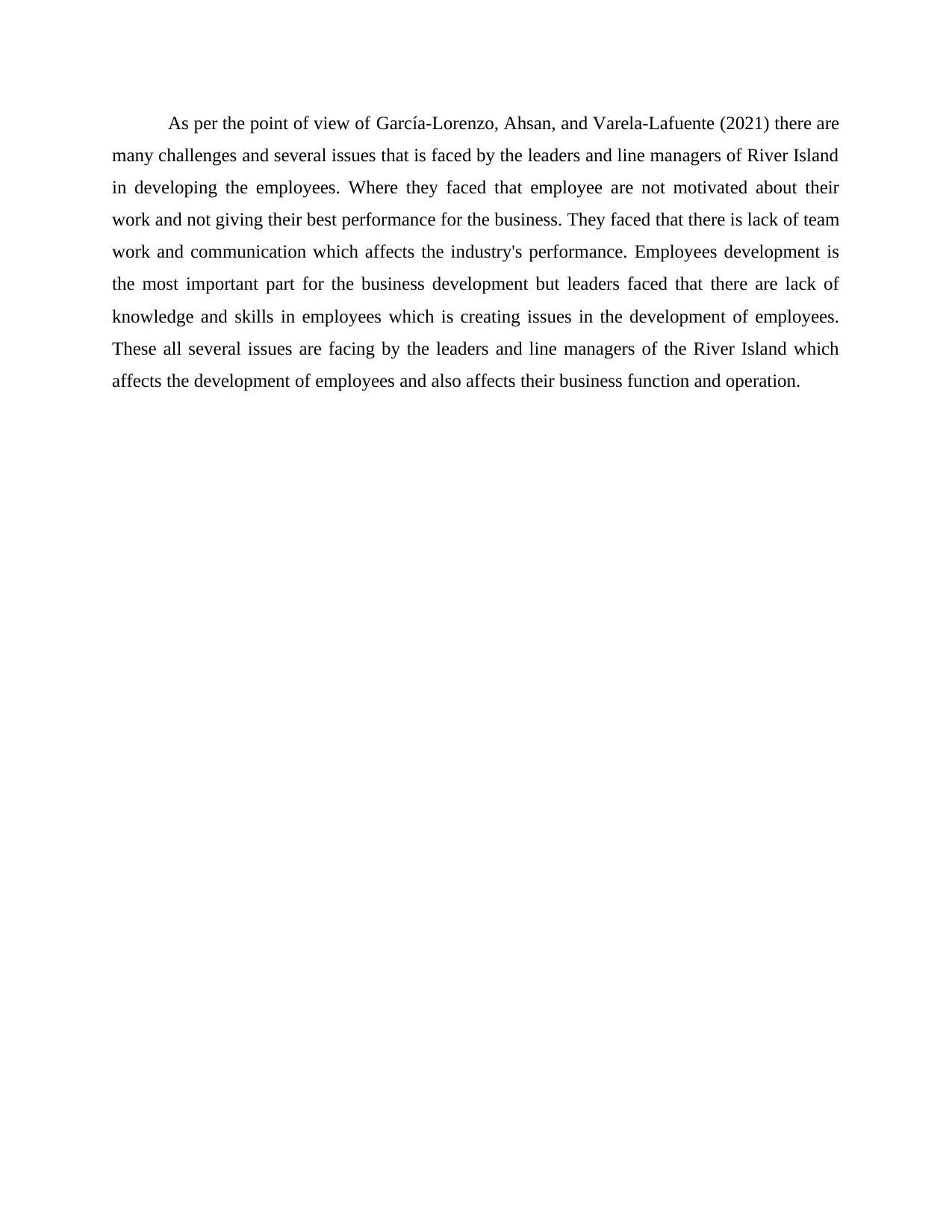
As per the point of view of García-Lorenzo, Ahsan, and Varela-Lafuente (2021) there are
many challenges and several issues that is faced by the leaders and line managers of River Island
in developing the employees. Where they faced that employee are not motivated about their
work and not giving their best performance for the business. They faced that there is lack of team
work and communication which affects the industry's performance. Employees development is
the most important part for the business development but leaders faced that there are lack of
knowledge and skills in employees which is creating issues in the development of employees.
These all several issues are facing by the leaders and line managers of the River Island which
affects the development of employees and also affects their business function and operation.
many challenges and several issues that is faced by the leaders and line managers of River Island
in developing the employees. Where they faced that employee are not motivated about their
work and not giving their best performance for the business. They faced that there is lack of team
work and communication which affects the industry's performance. Employees development is
the most important part for the business development but leaders faced that there are lack of
knowledge and skills in employees which is creating issues in the development of employees.
These all several issues are facing by the leaders and line managers of the River Island which
affects the development of employees and also affects their business function and operation.
Paraphrase This Document
Need a fresh take? Get an instant paraphrase of this document with our AI Paraphraser
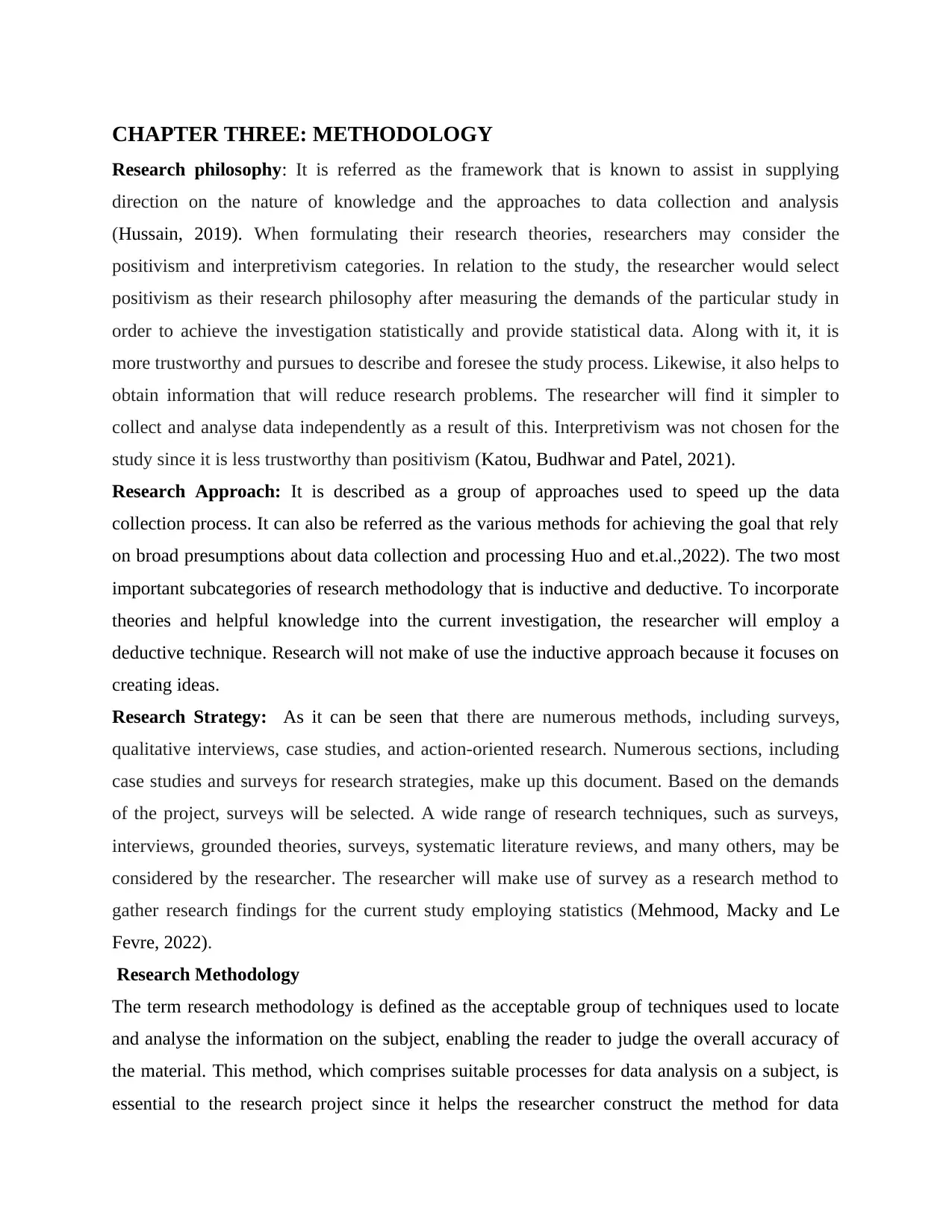
CHAPTER THREE: METHODOLOGY
Research philosophy: It is referred as the framework that is known to assist in supplying
direction on the nature of knowledge and the approaches to data collection and analysis
(Hussain, 2019). When formulating their research theories, researchers may consider the
positivism and interpretivism categories. In relation to the study, the researcher would select
positivism as their research philosophy after measuring the demands of the particular study in
order to achieve the investigation statistically and provide statistical data. Along with it, it is
more trustworthy and pursues to describe and foresee the study process. Likewise, it also helps to
obtain information that will reduce research problems. The researcher will find it simpler to
collect and analyse data independently as a result of this. Interpretivism was not chosen for the
study since it is less trustworthy than positivism (Katou, Budhwar and Patel, 2021).
Research Approach: It is described as a group of approaches used to speed up the data
collection process. It can also be referred as the various methods for achieving the goal that rely
on broad presumptions about data collection and processing Huo and et.al.,2022). The two most
important subcategories of research methodology that is inductive and deductive. To incorporate
theories and helpful knowledge into the current investigation, the researcher will employ a
deductive technique. Research will not make of use the inductive approach because it focuses on
creating ideas.
Research Strategy: As it can be seen that there are numerous methods, including surveys,
qualitative interviews, case studies, and action-oriented research. Numerous sections, including
case studies and surveys for research strategies, make up this document. Based on the demands
of the project, surveys will be selected. A wide range of research techniques, such as surveys,
interviews, grounded theories, surveys, systematic literature reviews, and many others, may be
considered by the researcher. The researcher will make use of survey as a research method to
gather research findings for the current study employing statistics (Mehmood, Macky and Le
Fevre, 2022).
Research Methodology
The term research methodology is defined as the acceptable group of techniques used to locate
and analyse the information on the subject, enabling the reader to judge the overall accuracy of
the material. This method, which comprises suitable processes for data analysis on a subject, is
essential to the research project since it helps the researcher construct the method for data
Research philosophy: It is referred as the framework that is known to assist in supplying
direction on the nature of knowledge and the approaches to data collection and analysis
(Hussain, 2019). When formulating their research theories, researchers may consider the
positivism and interpretivism categories. In relation to the study, the researcher would select
positivism as their research philosophy after measuring the demands of the particular study in
order to achieve the investigation statistically and provide statistical data. Along with it, it is
more trustworthy and pursues to describe and foresee the study process. Likewise, it also helps to
obtain information that will reduce research problems. The researcher will find it simpler to
collect and analyse data independently as a result of this. Interpretivism was not chosen for the
study since it is less trustworthy than positivism (Katou, Budhwar and Patel, 2021).
Research Approach: It is described as a group of approaches used to speed up the data
collection process. It can also be referred as the various methods for achieving the goal that rely
on broad presumptions about data collection and processing Huo and et.al.,2022). The two most
important subcategories of research methodology that is inductive and deductive. To incorporate
theories and helpful knowledge into the current investigation, the researcher will employ a
deductive technique. Research will not make of use the inductive approach because it focuses on
creating ideas.
Research Strategy: As it can be seen that there are numerous methods, including surveys,
qualitative interviews, case studies, and action-oriented research. Numerous sections, including
case studies and surveys for research strategies, make up this document. Based on the demands
of the project, surveys will be selected. A wide range of research techniques, such as surveys,
interviews, grounded theories, surveys, systematic literature reviews, and many others, may be
considered by the researcher. The researcher will make use of survey as a research method to
gather research findings for the current study employing statistics (Mehmood, Macky and Le
Fevre, 2022).
Research Methodology
The term research methodology is defined as the acceptable group of techniques used to locate
and analyse the information on the subject, enabling the reader to judge the overall accuracy of
the material. This method, which comprises suitable processes for data analysis on a subject, is
essential to the research project since it helps the researcher construct the method for data
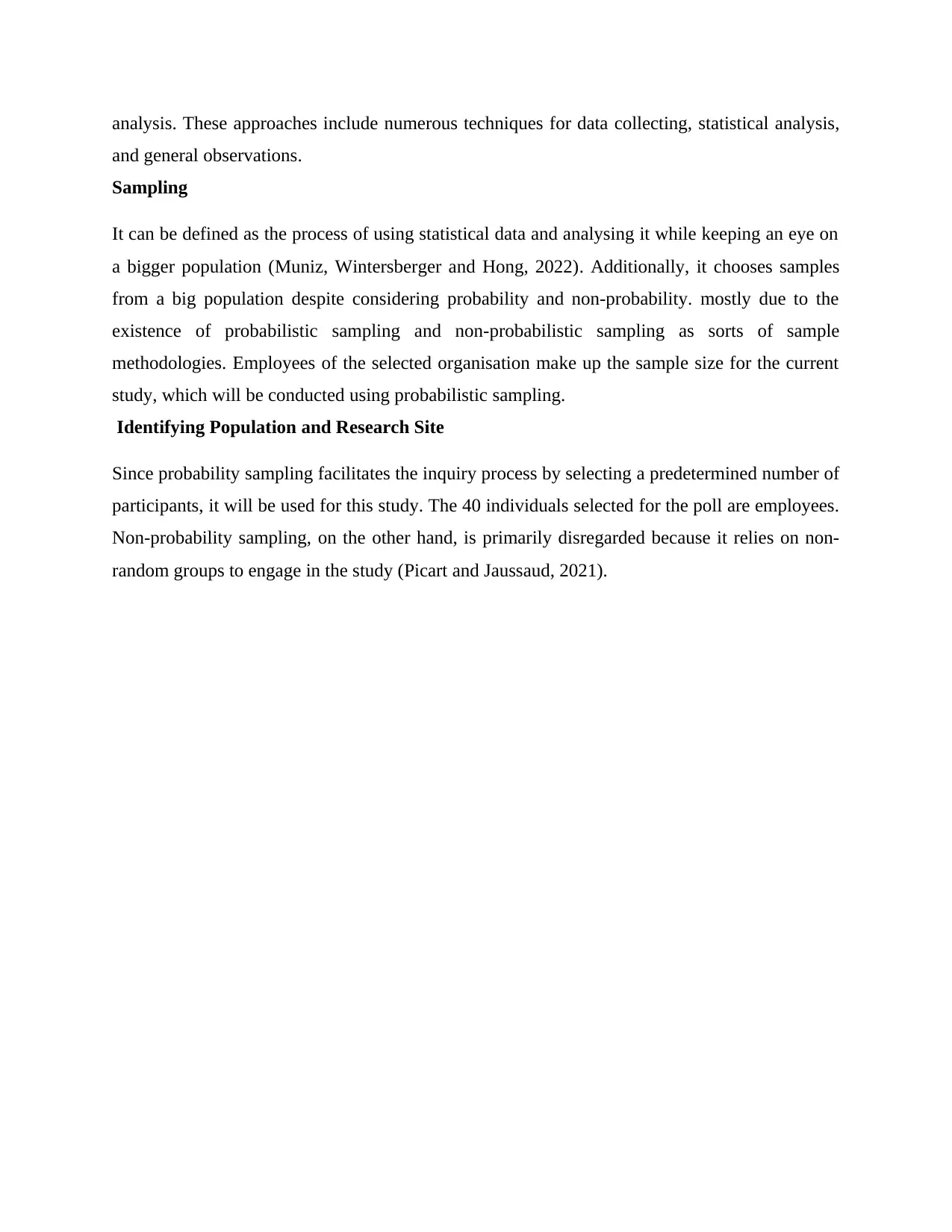
analysis. These approaches include numerous techniques for data collecting, statistical analysis,
and general observations.
Sampling
It can be defined as the process of using statistical data and analysing it while keeping an eye on
a bigger population (Muniz, Wintersberger and Hong, 2022). Additionally, it chooses samples
from a big population despite considering probability and non-probability. mostly due to the
existence of probabilistic sampling and non-probabilistic sampling as sorts of sample
methodologies. Employees of the selected organisation make up the sample size for the current
study, which will be conducted using probabilistic sampling.
Identifying Population and Research Site
Since probability sampling facilitates the inquiry process by selecting a predetermined number of
participants, it will be used for this study. The 40 individuals selected for the poll are employees.
Non-probability sampling, on the other hand, is primarily disregarded because it relies on non-
random groups to engage in the study (Picart and Jaussaud, 2021).
and general observations.
Sampling
It can be defined as the process of using statistical data and analysing it while keeping an eye on
a bigger population (Muniz, Wintersberger and Hong, 2022). Additionally, it chooses samples
from a big population despite considering probability and non-probability. mostly due to the
existence of probabilistic sampling and non-probabilistic sampling as sorts of sample
methodologies. Employees of the selected organisation make up the sample size for the current
study, which will be conducted using probabilistic sampling.
Identifying Population and Research Site
Since probability sampling facilitates the inquiry process by selecting a predetermined number of
participants, it will be used for this study. The 40 individuals selected for the poll are employees.
Non-probability sampling, on the other hand, is primarily disregarded because it relies on non-
random groups to engage in the study (Picart and Jaussaud, 2021).
⊘ This is a preview!⊘
Do you want full access?
Subscribe today to unlock all pages.

Trusted by 1+ million students worldwide
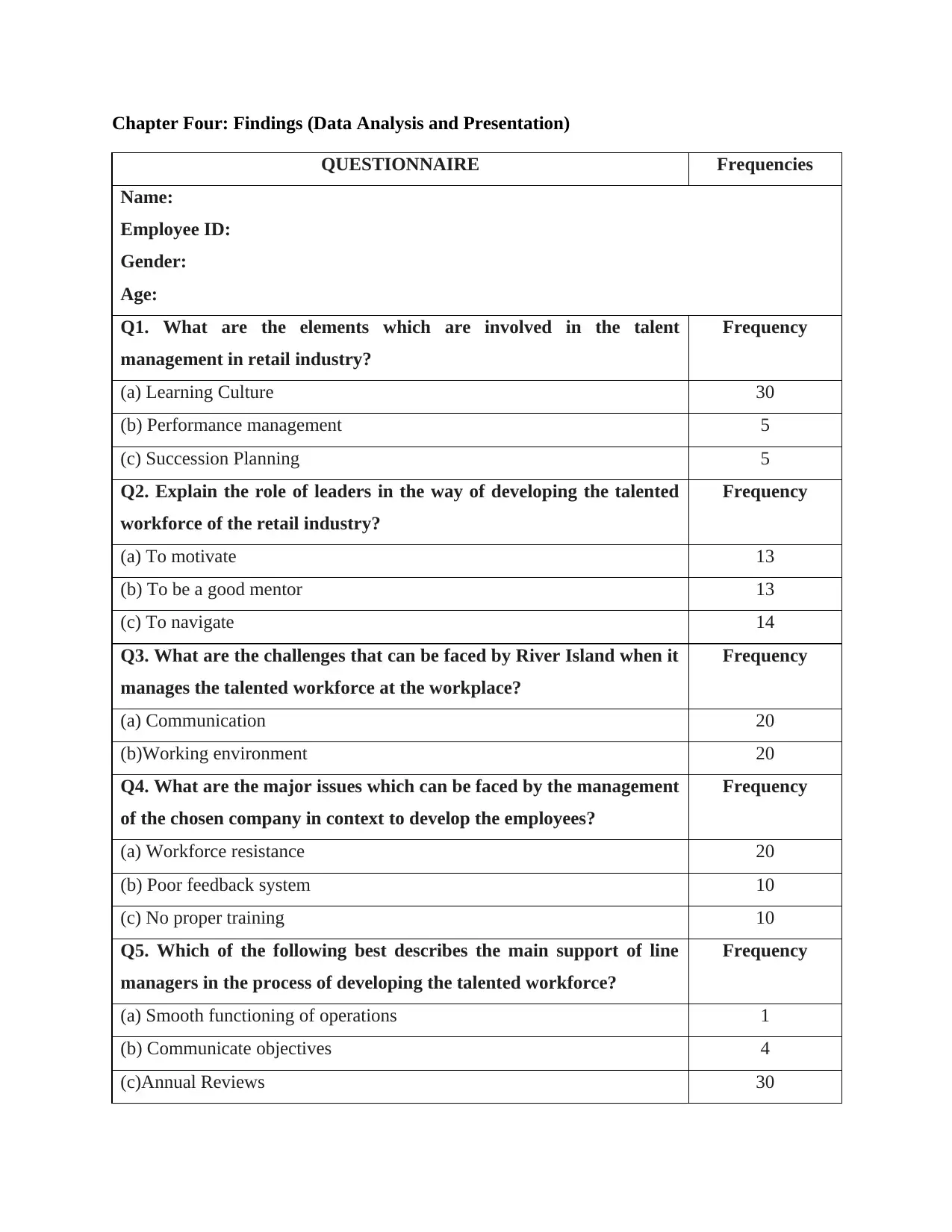
Chapter Four: Findings (Data Analysis and Presentation)
QUESTIONNAIRE Frequencies
Name:
Employee ID:
Gender:
Age:
Q1. What are the elements which are involved in the talent
management in retail industry?
Frequency
(a) Learning Culture 30
(b) Performance management 5
(c) Succession Planning 5
Q2. Explain the role of leaders in the way of developing the talented
workforce of the retail industry?
Frequency
(a) To motivate 13
(b) To be a good mentor 13
(c) To navigate 14
Q3. What are the challenges that can be faced by River Island when it
manages the talented workforce at the workplace?
Frequency
(a) Communication 20
(b)Working environment 20
Q4. What are the major issues which can be faced by the management
of the chosen company in context to develop the employees?
Frequency
(a) Workforce resistance 20
(b) Poor feedback system 10
(c) No proper training 10
Q5. Which of the following best describes the main support of line
managers in the process of developing the talented workforce?
Frequency
(a) Smooth functioning of operations 1
(b) Communicate objectives 4
(c)Annual Reviews 30
QUESTIONNAIRE Frequencies
Name:
Employee ID:
Gender:
Age:
Q1. What are the elements which are involved in the talent
management in retail industry?
Frequency
(a) Learning Culture 30
(b) Performance management 5
(c) Succession Planning 5
Q2. Explain the role of leaders in the way of developing the talented
workforce of the retail industry?
Frequency
(a) To motivate 13
(b) To be a good mentor 13
(c) To navigate 14
Q3. What are the challenges that can be faced by River Island when it
manages the talented workforce at the workplace?
Frequency
(a) Communication 20
(b)Working environment 20
Q4. What are the major issues which can be faced by the management
of the chosen company in context to develop the employees?
Frequency
(a) Workforce resistance 20
(b) Poor feedback system 10
(c) No proper training 10
Q5. Which of the following best describes the main support of line
managers in the process of developing the talented workforce?
Frequency
(a) Smooth functioning of operations 1
(b) Communicate objectives 4
(c)Annual Reviews 30
Paraphrase This Document
Need a fresh take? Get an instant paraphrase of this document with our AI Paraphraser
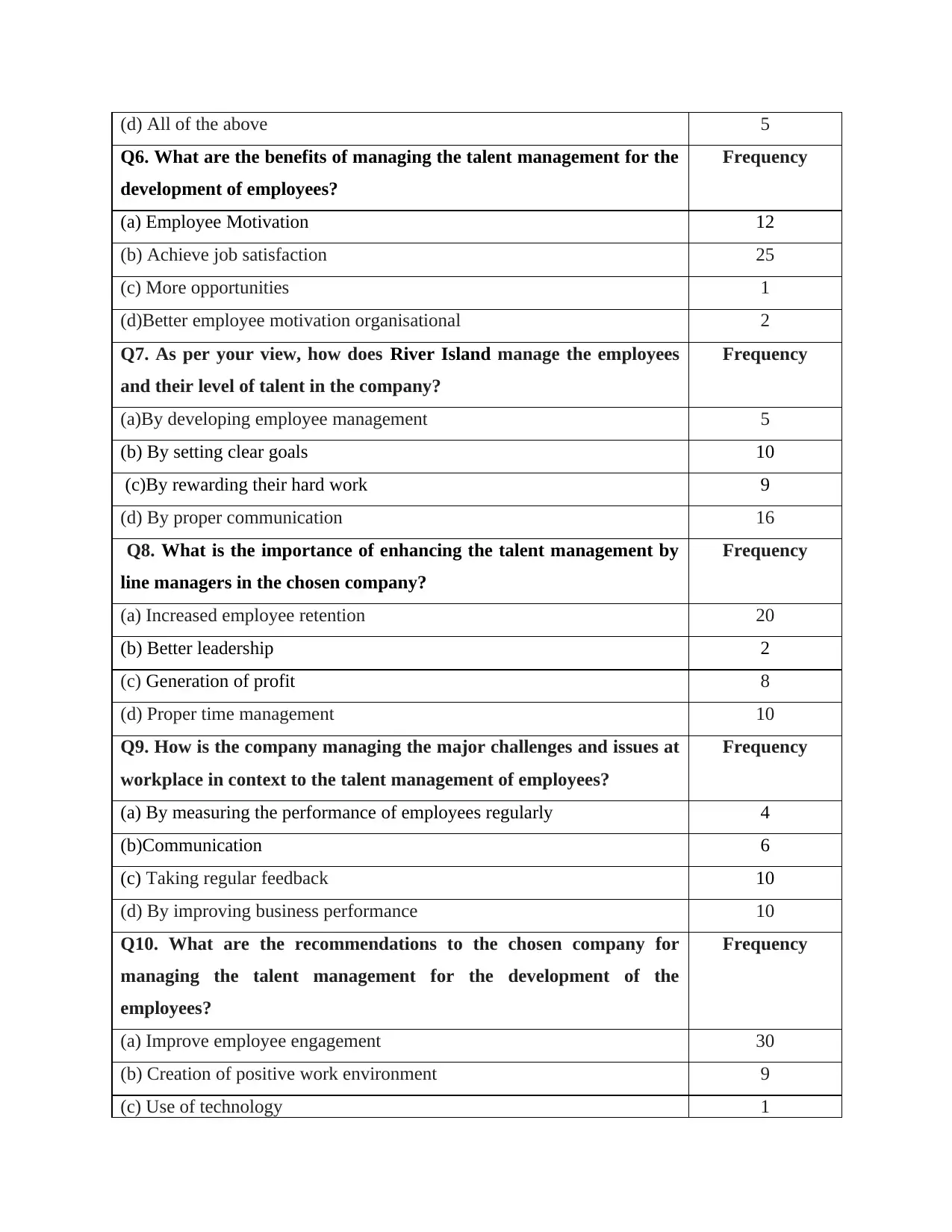
(d) All of the above 5
Q6. What are the benefits of managing the talent management for the
development of employees?
Frequency
(a) Employee Motivation 12
(b) Achieve job satisfaction 25
(c) More opportunities 1
(d)Better employee motivation organisational 2
Q7. As per your view, how does River Island manage the employees
and their level of talent in the company?
Frequency
(a)By developing employee management 5
(b) By setting clear goals 10
(c)By rewarding their hard work 9
(d) By proper communication 16
Q8. What is the importance of enhancing the talent management by
line managers in the chosen company?
Frequency
(a) Increased employee retention 20
(b) Better leadership 2
(c) Generation of profit 8
(d) Proper time management 10
Q9. How is the company managing the major challenges and issues at
workplace in context to the talent management of employees?
Frequency
(a) By measuring the performance of employees regularly 4
(b)Communication 6
(c) Taking regular feedback 10
(d) By improving business performance 10
Q10. What are the recommendations to the chosen company for
managing the talent management for the development of the
employees?
Frequency
(a) Improve employee engagement 30
(b) Creation of positive work environment 9
(c) Use of technology 1
Q6. What are the benefits of managing the talent management for the
development of employees?
Frequency
(a) Employee Motivation 12
(b) Achieve job satisfaction 25
(c) More opportunities 1
(d)Better employee motivation organisational 2
Q7. As per your view, how does River Island manage the employees
and their level of talent in the company?
Frequency
(a)By developing employee management 5
(b) By setting clear goals 10
(c)By rewarding their hard work 9
(d) By proper communication 16
Q8. What is the importance of enhancing the talent management by
line managers in the chosen company?
Frequency
(a) Increased employee retention 20
(b) Better leadership 2
(c) Generation of profit 8
(d) Proper time management 10
Q9. How is the company managing the major challenges and issues at
workplace in context to the talent management of employees?
Frequency
(a) By measuring the performance of employees regularly 4
(b)Communication 6
(c) Taking regular feedback 10
(d) By improving business performance 10
Q10. What are the recommendations to the chosen company for
managing the talent management for the development of the
employees?
Frequency
(a) Improve employee engagement 30
(b) Creation of positive work environment 9
(c) Use of technology 1
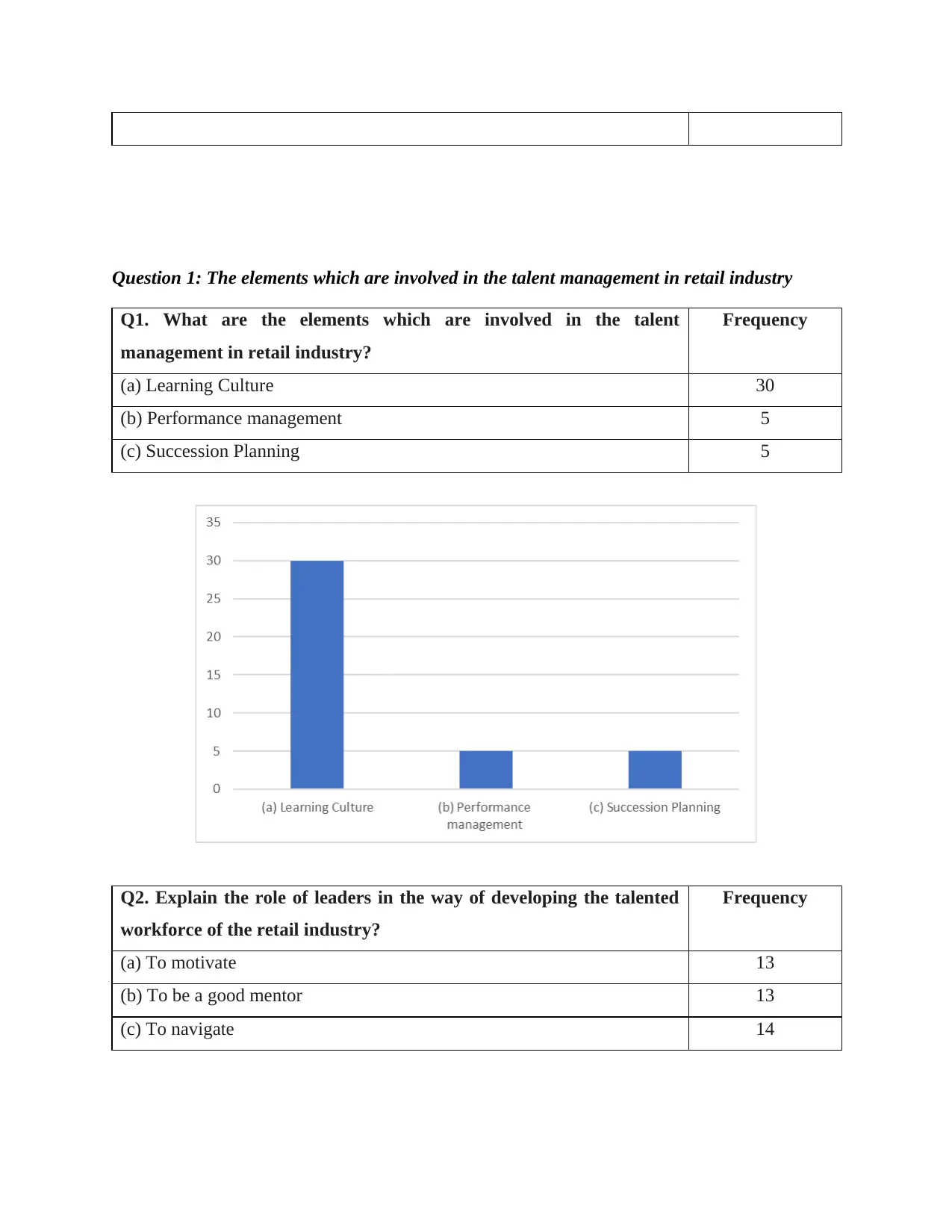
Question 1: The elements which are involved in the talent management in retail industry
Q1. What are the elements which are involved in the talent
management in retail industry?
Frequency
(a) Learning Culture 30
(b) Performance management 5
(c) Succession Planning 5
Q2. Explain the role of leaders in the way of developing the talented
workforce of the retail industry?
Frequency
(a) To motivate 13
(b) To be a good mentor 13
(c) To navigate 14
Q1. What are the elements which are involved in the talent
management in retail industry?
Frequency
(a) Learning Culture 30
(b) Performance management 5
(c) Succession Planning 5
Q2. Explain the role of leaders in the way of developing the talented
workforce of the retail industry?
Frequency
(a) To motivate 13
(b) To be a good mentor 13
(c) To navigate 14
⊘ This is a preview!⊘
Do you want full access?
Subscribe today to unlock all pages.

Trusted by 1+ million students worldwide
1 out of 26
Related Documents
Your All-in-One AI-Powered Toolkit for Academic Success.
+13062052269
info@desklib.com
Available 24*7 on WhatsApp / Email
![[object Object]](/_next/static/media/star-bottom.7253800d.svg)
Unlock your academic potential
Copyright © 2020–2026 A2Z Services. All Rights Reserved. Developed and managed by ZUCOL.





